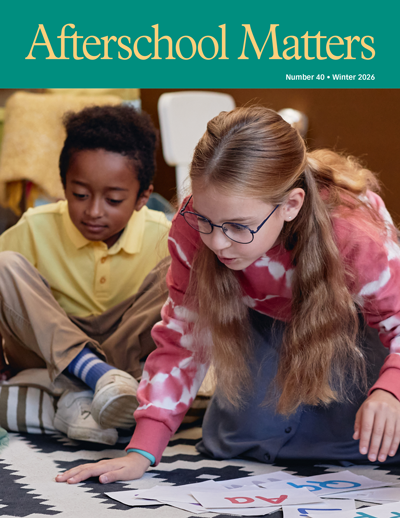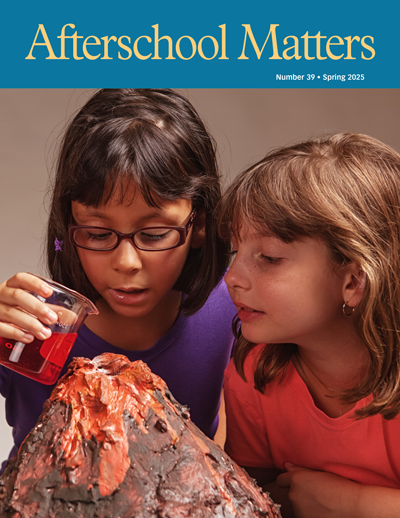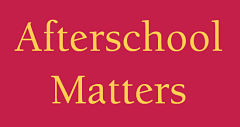Out-of-School Time Programs Promote Positive Environments & Youth Development
April 25, 2018
Spring 2018 Afterschool Matters Journal Now Available: April 24, 2018
WELLESLEY, MA – The newest issue of Afterschool Matters, the national, peer-reviewed journal dedicated to promoting professionalism, scholarship, and consciousness in the field of afterschool education, reflects on the field’s commitment to the value of the life of every student, in school and out—a timely focus as youth and young adults rally for safety and equity nationwide and educators strive to provide the highest quality environments that encourage learning and growth.
“Our authors remind us that afterschool programs nurture positive peer relationships, that in turn foster learning in and out of the classroom,” writes Managing Editor Georgia Hall, Ph.D., senior research scientist at the National Institute on Out-of-School Time. “They show us how afterschool programs help young people take on leadership roles to work toward social justice and environmental stewardship.“
Contributor Tanya Wiggins, Ed.D., a clinical assistant professor in education at Pace University who has spent half of her 20 years as an educator serving youth in community-based organizations, examines how critical friendships can help youth build their own social capital and counteract negative messages from society and peers. Analyzing a small-sample study within an urban youth program, she asserts that the findings provide lessons to youth-serving organizations.
“Programs can explicitly set expectations for interactions through participant orientations, physical reminders in the space, and staff-participant interactions,” Wiggins writes. “Modeling respectful and caring interactions will inform the norms and obligations that participants develop as they build critical friendships.”
Articles included in the Spring 2018 issue of Afterschool Matters include:
- “Critical Friendship: Helping Youth Lift as They Climb Together,” by Wiggins;
- “Youth-Led Participatory Action Research: Promoting Youth Voice and Adult Support in Afterschool Programs,” by Yolanda Anyon, Ph.D., PPSC, Heather Kennedy, M.P.H., Rebecca Durbahn, M.S.W., and Jeffrey M. Jenson, Ph.D.;
- “Seed Balls and the Circle of Courage: A Decolonization Model of Youth Development in an Environmental Stewardship Program,” by A. R. S. Wenger-Schulman, M.A., and Lauren Hoffman, B.A.;
- “Positive Change Through a Credential Process,” by Tinnycua Williams. B.A.;
- “Measuring Program Quality, Part 2: Addressing Potential Cultural Bias in a Rate Reliability Exam,” by Amanda Richer, M.A., Linda Charmamaran, Ph.D., and Ineke Ceder, B.A.; and
- “Beyond ‘Research into Practice’,” a review by Diane Gruber, MA, LMHC, of Creating Research-Practice Partnerships in Education, a book by William Penuel and Daniel Gallagher.
Published two to three times annually with legacy support from the Robert Bowne Foundation, Afterschool Matters serves those involved in developing and running programs for youth during the out-of-school time hours, in addition to those engaged in research and in shaping youth development policy.
An affiliated initiative, the National Afterschool Matters Fellowship, is a two-year professional development and leadership training program unique in its national reach and incorporation of technology for ongoing collaboration. This partnership between two experienced national leaders, NIOST and the National Writing Project (NWP) is also supported by funding from the Robert Bowne Foundation. Author-contributor Tinnycua Williams recently completed the Afterschool Matters Practitioner Research Fellowship.
For nearly 40 years, the National Institute on Out-of-School Time (NIOST) has been a leader in defining, shaping, and promoting out-of-school time (OST) as a distinct professional field with evidence-based quality standards. NIOST bridges the worlds of research and practice to provide OST directors, staff, planners, school administrators, community leaders, and others with research, training, evaluation, and consultation to enhance and improve the quality of programs for all children and youth. NIOST is a program of the Wellesley Centers for Women (WCW), a premier women- and gender-focused, social-change oriented research-and-action institute at Wellesley College. In addition to her role at NIOST, Hall serves as an associate director of WCW.
More information about Afterschool Matters, including links to current and past issues of the journal, is available at niost.org/afterschoolmatters.



